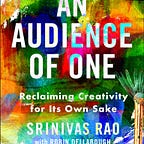Creative Success Requires Us to Play the Infinite Game
In his How to Stay Motivated Seminar Zig Ziglar tells the story of the Chinese Bamboo tree. In the first 4 years, the tree doesn’t grow at all. In the 5th year, it grows 90 feet. On the surface, it might have appeared that all that growth took place in the 5th year, but the 4 years that came before matter just as much.
It’s very much like the 10-year overnight success.
When I moved to Costa Rica in 2011, I lived near a surf spot called Avellanas. The waves were hollower, faster and more challenging than anything I had surfed in Southern California. For the first month, I felt like a complete beginner again. I hesitated, I let waves pass me by, and I fell off my board a lot.
Then I moved to another beach where I surfed every day. Before I came home, I went back to Avellanas one last time and I had one of the highest wave count sessions I’ve had in my life. My surfing was at a completely different level. On the surface it might have appeared that I had some inherent ability to surf, but the3 months I spent surfing everyday mattered just as much as that lat session at Avellanas.
Invisible Progress and Planting Seeds
During many of our phases of learning growth, it appears as if nothing is happening. I used the term “invisible progress” to describe this. We are making progress but we can’t see any of the results externally. But each day that we do the work counts. Each day carries us that much closer to hitting momentum.
Most things start small, far smaller than we know them to be by the time they seem omnipresent in our lives. The life of anyone who creates something from nothing is like that of a farmer.
We wake up early
We plant seeds
We water our crops
We work our assess off
Rinse, wash, repeat.
In an always on, excessive consumption, immediate feedback world we tend to get impatient about the seeds we’ve planted. We impede our progress. This is the equivalent of puling a plant out of the ground to make sure it’s growing.
- With every habit we plant seeds
- Wit every hour of deep work, we plant seeds
- With every day that we write 1000 words, we plant seeds
- With every interaction, connection and relationship we build, we plant seeds.
In 2013, I planted a seed. I had no idea that it would bear the fruit that it did. It was the story of how writing 1000 words a day changed my life. Two years after it was written my editor contacted me about writing a book. But I never stopped planting seeds and watering them during that two year period.
Plant seeds, water your crops, nurture them and remain patient. As Paul Graham once said
“The way to do really big things seems to be to start with deceptively small things.”
Success Gives you the Conditional Opportunity to Try Again
In 2014 I interviewed Tucker Max for the Unmistakable Creative. He’s sold millions of copies of his books and built a thriving career. But what stood out to me most was the advice that he was given by an editor after the success of his first book.
Success gives you the conditional opportunity to try again.
There really is no such thing as an I’ve made it moment. If anything when you do “make it” the work is just starting.
- When your startup gets venture funded you haven’t made it., You’ve just started. Now you have to build a company and produce a return for your investors.
- When you sign a contract to write a book, you haven’t made it. You’ve just started. Now you have to write, market and sell a book.
- When a player gets drafted into the NBA he hasn’t made it. His work has just started. Now he has to demonstrate his value to a team and prove that he can hack it in the league.
Believing that you’ve made it leads to complacency, which eventually impacts the quality of the work.
In his audio seminar Leap First, Seth Godin talks about a concept called the Infinite Game, (based on a book by author James Carse). As Seth says “the infinite game is one you play to play, not to win.” Creative success requires us to play the infinite game.
When we experience creative success of any sort, what happens is that we get to keep playing the game. Commercial creative success isn’t about reaching some end point where you can sit in a hammock, drink mai tais and count your cash. It’s about the conditional opportunity to try again and play the infinite game.
I’m the host and founder of The Unmistakable Creative Podcast. Every Sunday we share the most unmistakable parts of the internet that we have discovered in The Sunday Quiver. Receive our next issue by signing up here.
